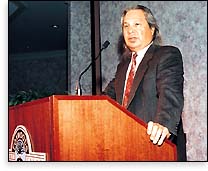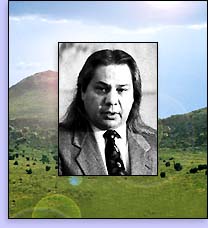
|


by Carlynn Lee McCormick and Thomas G. Whittle

t makes little difference where one opens the record of the history of the Indians; every page and every year has its dark stain. The story of one tribe is the story of all, varied only by differences of time and place; but neither time nor place makes any difference in the main facts. Colorado is as greedy and unjust in 1880 as was Georgia in 1830, and Ohio in 1795; and the United States government breaks promises now as deftly as then, and with an added ingenuity from long practice.”
When Helen Hunt Jackson published those words in A Century of Dishonor in 1881, she could not have predicted that there would follow yet another century and more of unfulfilled promises and broken treaties.
John E. Echohawk, attorney and member of the Pawnee tribe of Oklahoma, has battled for over three decades for justice for Indian tribes and has found ways to correct centuries-old injustices through the law.
A power in the Native American rights movement, Echohawk has long been regarded as one of the foremost litigators in matters of tribal sovereignty and the safeguarding of natural resources and ancestral burial sites. He was recognized as one of the 100 most influential lawyers in America by the National Law Journal.
In 1970, after the University of New Mexico School of Law initiated a program to make legal careers more accessible to Indians, Echohawk became the first graduate. According to Echohawk, the program came at the crucial time when the federal government was “systematically” dismantling reservations through legislation.
Echohawk soon earned a national reputation, leading efforts to protect and advance the rights of his people. In 1970, he co-founded the Native American Rights Fund (NARF), which he continues to serve as executive director. A nonprofit organization headquartered in Boulder, Colorado, NARF hires experts in Indian law and makes them available to tribes that lack counsel. “That used to be nearly all of them,” Echohawk explained, “but we’re gradually changing that. A lot more tribes today have attorneys, but we still have a lot of work to do.”
Bob Peregoy, a former NARF attorney in Washington, D.C., has worked with Echohawk for many years. He told Freedom that Echohawk’s efforts on behalf of Indian tribes and peoples has resulted in invaluable contacts in the private and public sectors and has opened doors that led to increased protection of human rights, natural resources and tribal sovereignty. “[We] are fortunate to have a warrior of this caliber to mentor us in our collective struggle for justice,” Peregoy said.
“[We] are fortunate to have a warrior of this caliber to mentor us in our collective struggle for justice.” – Bob Peregoy
|
|
Stolen Revenues
Although tribes and individual Indians have certain exclusive rights under federal law, some have been widely ignored. Indians, for example, are entitled to revenue from resources that exist on their land, such as timber, coal, oil and gas. Income from sale or lease of these resources is held in trust by the federal government.
Indian landowners are rarely given all of the money their resources have earned, however, with the result that many are among the nation’s most impoverished citizens. The government has mismanaged, diverted and lost billions of dollars from Indian trust accounts.
The Bureau of Indian Affairs (BIA) is unable to provide even the most basic of statements to account holders. In testimony before Congress, Echohawk called this “yet another serious and continuing breach in a long history of dishonorable treatment of Indian tribes and individual Indians by the United States government.”
Echohawk said that Indians have long been hopeful that a remedy for BIA mismanagement could be found. They were heartened in 1994 when Congress enacted the Indian Trust Fund Management Reform Act — and then let down when the Administration and Congress failed to provide funding to implement it.
Without money, the reform amounted to little more than a pile of paper. With no recourse, in June 1996, Echohawk filed a class action lawsuit in federal court on behalf of the more than 300,000 Indians who claimed the government had misappropriated their money. The matter remains in federal court.
Defending Treaty Rights

|
 |
For more than three decades, John E. Echohawk has spearheaded efforts to protect and advance the rights of Native Americans and has found ways to correct centuries-old injustices. |
 |
Another issue high on Echohawk’s priorities is defense of treaty and aboriginal water rights. He represents many tribes in this regard, including the 55,356-acre Tule Reservation, east of Porterville, California. Perhaps it was Echohawk’s dedication and expertise in this area that prompted President Clinton’s 1995 appointment of him to the Western Water Policy Review Commission.
Echohawk also serves on the boards of such organizations as the American Indian Resource Institute, the Association on American Indian Affairs and the National Center for American Indian Enterprise Development, and was under consideration for the position of Assistant Interior Secretary for the Department of Indian Affairs, after Ada Deer resigned from that post in 1997.
He quietly withdrew his name, however, stating, “I already have a good job.”
Tragedy in Alaska
Today, Echohawk continues in the vanguard of crucial human rights efforts, such as preserving tribal existence wherever it is threatened. In this regard, he told Freedom that one of his most important concerns is the fight for sovereignty in Alaska’s native villages.
For centuries, these tribes struggled to maintain their traditional hunting, fishing and gathering societies. Their isolation permitted them to survive in subsistence-based communities and allowed them to bypass the wars and relocations so destructive to Indians in the lower 48 states. Nevertheless, native Alaskans control only five percent of the state and have been swept up in the economic, social and health problems that have plagued other Indians.
Looking to remedy the situation, the Alaska Natives Commission recommended in 1994 that village tribes be given the right to govern themselves. These recommendations were consistent with a study of native populations by Harvard economics professor Steve Kalt, who concluded that the single greatest factor leading to healthier and more successful native communities was the ability to exercise their right to self-government.
In November 1996, that goal was realized when NARF represented the village of Venetie, a tribal community in Alaska’s interior, in its battle with state legislators. The U.S. Court of Appeals for the Ninth Circuit rebuffed an 11-year-old challenge by the state to the tribal sovereignty of the village.
The victory, however, was short-lived. By the next year, the state legislature appropriated $1 million to take the Appeals Court’s ruling to the U.S. Supreme Court. According to Echohawk, the villages faced “a concerted attack by the state of Alaska and its congressional delegation to extinguish their inherent right to govern themselves.”
In spite of support for tribal self-government from Senators Ben Nighthorse Campbell (R-Colorado), Daniel Inouye (D-Hawaii) and John McCain (R-Arizona), among many others, the Supreme Court ruled in 1998 against the Indians.
But the issue of tribal independence in Alaska is far from dead, according to Echohawk. In his words, “We never give up.” NARF is working on strategies to regain tribal jurisdiction over the disputed territory.
A Race of the Future
“The federal government should live up to its promises, its treaties, its commitments to native people.” — John E. Echohawk
|
|
In dealing with the issue of stolen land, Echohawk points out that not much can be done about the past. NARF was organized to resolve disputes that exist today. Echohawk, however, feels it is wrong that Indians must fight for their rights. “We should have the support of the American people and the leaders in this country in resolving these issues promptly,” he said. He believes that “the federal government should live up to its promises, its treaties, its commitments to native people.”
Part of the problem is that some segments of society assume Indians are a race of the past, an extinct and vanishing people. That is not the situation at all, he noted: “Tribes are rebuilding their nations very forcefully and very successfully.”
Toward that end, Indian nations are fortunate to have John Echohawk and the Native American Rights Fund to champion their cause. Indeed, the United States benefits. The guarantee of human rights and dignity is, after all, what the Constitution is all about.
|

|







